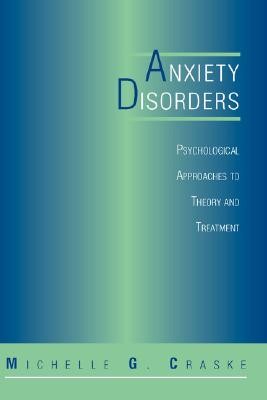| Anxiety Disorders: Psychological Approaches to Theory and Treatment Contributor(s): Craske, Michelle G. (Author) |
|
 |
ISBN: 0813332508 ISBN-13: 9780813332505 Publisher: Basic Books OUR PRICE: $73.26 Product Type: Hardcover Published: November 1998 Annotation: Anxiety Disorders: Psychological Approaches to Their Theory and Treatment is a distinctive textbook combining theoretical research developments with a discussion of the nature and treatment of anxiet |
| Additional Information |
| BISAC Categories: - Psychology | Neuropsychology |
| Dewey: 616.852 |
| LCCN: 98019027 |
| Lexile Measure: 1470 |
| Series: Perspectives in Clinical Psychology |
| Physical Information: 1.15" H x 6.28" W x 9.16" (1.52 lbs) 448 pages |
| Descriptions, Reviews, Etc. |
| Publisher Description: Anxiety Disorders: Psychological Approaches to Their Theory and Treatment is a distinctive textbook combining theoretical research developments with a discussion of the nature and treatment of anxiety disorders. Designed for advanced undergraduate and graduate courses, as well as for mental health professionals, the book presents psychological approaches to the conceptualization and treatment of adult anxiety disorders. Emphasizing theoretical and research developments in the areas of cognitive psychology, neuroscience, learning theory, and clinical psychology, Michelle G. Craske provides a cohesive presentation of issues that have a direct treatment application. Anxiety disorders discussed include: panic disorder and agoraphobia, social phobia, specific phobias, generalized anxiety disorder, and obsessive compulsive disorder.The first half of the book covers clinical and diagnostic presentation, etiological models, empirically supported treatment approaches, mechanisms of therapeutic change, methods for enhancing treatment effectiveness and efficiency, and integration of psychological and pharmacological treatment approaches. Recent theoretical and research developments are related to each topic. The second half of the book covers each anxiety disorder in detail, including conceptualization, treatment outcome data, application of research developments, and areas in need of further research. In addition, a detailed analysis of the most effective treatment is included for each anxiety disorder. A thorough list of references and resources appears at the end of the book. Thanks to its coverage of theoretical and empirical issues as well as treatment methods, Anxiety Disorders and Their Treatment is sure to be of relevance to researchers and mental health professionals as well as students. |